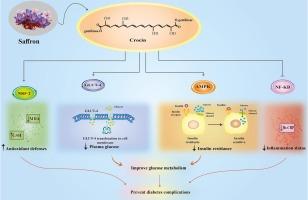二甲双胍治疗下的 2 型糖尿病患者补充巴豆苷对代谢和遗传参数的有益影响:随机双盲对照临床试验
IF 4
2区 农林科学
Q2 FOOD SCIENCE & TECHNOLOGY
引用次数: 0
摘要
背景和目的由于炎症和氧化应激(OS)在 2 型糖尿病(T2DM)的病因和复杂性中起着重要作用,因此抗氧化治疗被认为是控制疾病进展的有效方法。本研究旨在评估服用棒曲霉素对服用二甲双胍的 T2DM 患者的代谢和遗传指标的影响。患者被分为两组(n = 30),分别接受每天 15 毫克的巴豆苷补充剂或每天两次的安慰剂,为期 12 周。在干预开始和结束时采集空腹血液,以评估血糖指数、血脂含量、炎症指标和操作系统。使用实时聚合酶链式反应(real-time PCR)分析患者外周血单核细胞(PBMC)中与OS和炎症相关的基因表达。结果与安慰剂相比,摄入番茄红素能显著降低空腹血浆葡萄糖(P <0.001)、HbA1c(P = 0.002)、血清胰岛素水平(P = 0.03)和胰岛素抵抗(P <0.001),同时显著提高胰岛素敏感性(P <0.001)。与羊角霉素组的基线值相比,这些改善也具有统计学意义。此外,与安慰剂组相比,干预组的甘油三酯水平(P = 0.04)、VLDL-胆固醇(P = 0.04)、高敏 C 反应蛋白(P < 0.001)、丙二醛(P = 0.046)明显降低,血浆谷胱甘肽(P = 0.008)明显提高。此外,干预组的高敏 C 反应蛋白水平与基线相比有所下降,而安慰剂组则有所上升。巴豆苷能明显降低 TOS(P <0.05),但在试验结束时,两组之间没有明显差异。最终,与安慰剂相比,补充巴豆苷可诱导 AMP 激活蛋白激酶(P = 0.002)和葡萄糖转运体 4 型(P = 0.02),同时下调 PBMC 的核因子卡巴 B 基因表达水平(P = 0.04)。本文章由计算机程序翻译,如有差异,请以英文原文为准。

The beneficial effects of crocin supplementation on metabolic and genetic parameters in type 2 diabetic patients under metformin treatment: A randomized double-blind controlled clinical trial
Background and objective
Since it has been demonstrated that inflammation and oxidative stress (OS) are important in the etiology and complexity of type 2 diabetes mellitus (T2DM), antioxidant treatment is recognized as an effective approach for managing the progression of the disease. The current study was conducted to assess the effects of crocin administration on metabolic and genetic indices in T2DM patients who were receiving metformin.
Materials and methods
Sixty T2DM patients, receiving metformin, were included in our randomized double-blind placebo-controlled clinical trial. Patients were divided into two groups (n = 30) and received either 15 mg/day crocin supplementation or a placebo twice a day for 12 weeks. Fasting blood was obtained at the beginning and end of the intervention to assess glycemic index, lipid content, indicators of inflammation, and OS. Patients’ peripheral blood mononuclear cells (PBMC) were analyzed for gene expression associated with OS and inflammation using real-time polymerase chain reaction (real-time PCR).
Results
Crocin intake significantly decreased fasting plasma glucose (P < 0.001), HbA1c (P = 0.002), serum insulin levels (P = 0.03), and insulin resistance (P < 0.001), while significantly enhanced insulin sensitivity (P < 0.001) compared with the placebo. These improvements were also found to be statistically significant in comparison to the baseline values in the crocin group. Moreover, a significant reduction in triglyceride levels (P = 0.04), VLDL-cholesterol (P = 0.04), high-sensitivity C-reactive protein (P < 0.001), malondialdehyde (P = 0.046), and significant enhancement of plasma glutathione (P = 0.008) were found in the intervention group compared to the placebo group. Additionally, the level of high-sensitivity C-reactive protein in the intervention group decreased compared to baseline while it increased in the placebo group. Crocin significantly lowered TOS (P < 0.05); however, at the end of the trial there was no significant difference between the two groups. Eventually, crocin supplementation induced AMP-activated protein kinase (P = 0.002) and glucose transporter type 4 (P = 0.02), while downregulating nuclear factor kappa B gene expression levels (P = 0.04) of PBMC compared to the placebo.
Conclusion
Overall, crocin supplementation was demonstrated to have ameliorative effects on glycemic indices as well as cardio-metabolic risk.
求助全文
通过发布文献求助,成功后即可免费获取论文全文。
去求助
来源期刊

Journal of Functional Foods
FOOD SCIENCE & TECHNOLOGY-
CiteScore
9.60
自引率
1.80%
发文量
428
审稿时长
76 days
期刊介绍:
Journal of Functional Foods continues with the same aims and scope, editorial team, submission system and rigorous peer review. We give authors the possibility to publish their top-quality papers in a well-established leading journal in the food and nutrition fields. The Journal will keep its rigorous criteria to screen high impact research addressing relevant scientific topics and performed by sound methodologies.
The Journal of Functional Foods aims to bring together the results of fundamental and applied research into healthy foods and biologically active food ingredients.
The Journal is centered in the specific area at the boundaries among food technology, nutrition and health welcoming papers having a good interdisciplinary approach. The Journal will cover the fields of plant bioactives; dietary fibre, probiotics; functional lipids; bioactive peptides; vitamins, minerals and botanicals and other dietary supplements. Nutritional and technological aspects related to the development of functional foods and beverages are of core interest to the journal. Experimental works dealing with food digestion, bioavailability of food bioactives and on the mechanisms by which foods and their components are able to modulate physiological parameters connected with disease prevention are of particular interest as well as those dealing with personalized nutrition and nutritional needs in pathological subjects.
 求助内容:
求助内容: 应助结果提醒方式:
应助结果提醒方式:


